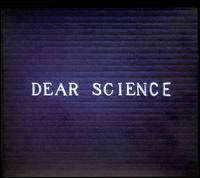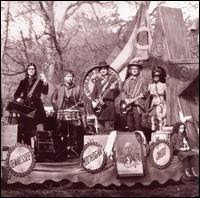
The debut album from Seattle’s Fleet Foxes seemingly came out of nowhere to quickly become one of the more critically acclaimed albums of 2008. While many compare the album to The Beach Boys’ classic Pet Sounds (with its earthy feel, rich harmonies, and consistently great songwriting) simply confining their sound to this is both an injustice and simply inaccurate. Fleet Foxes confidently combine indie folk, Baroque pop, and even elements of Medieval music to create a wholly organic sound that will grow and flourish from your speakers. The band is led by Robin Pecknold who resembles Tom Hanks’ character in Castaway in his unkempt appearance, but more significantly by being completely immersed and in touch with the environment around him (which I’ll explain more later on). Although Fleet Foxes is a five-member band, the other members essentially orbit around Pecknold by backing him instrumentally (guitar, bass guitar, piano, drums, and the occasional mandolin) or vocally (with staggering harmonies).
With this self-titled release, Fleet Foxes have created a stunningly fresh sound for modern music. When we think about past artists that are credited for having pioneered a new sound for rock/pop, the majority did so by skillfully implementing new songwriting techniques, mixing up instrumentation roles, or by using the newest technological advances. Whatever path they took, most of them were intending to capture the sound of that particular era. We have seen this over the past 50 years of rock and continue to see it today. Take for example the Arcade Fire, who over their first two albums have written very anthemic, thunderous songs that can be said to embody the general dissatisfaction with the Bush-era United States. Or take LCD Soundsystem, a musical vehicle that implements electronic instruments alongside guitars and drums to mirror the technologically inundated lives we live. What’s most astonishing about Fleet Foxes is that they are pioneering a new sound for rock not by drawing from today’s world, but rather from a past world. As we listen to these solid, reverb-drenched songs, it’s almost as if we’re listening to an echo that was first generated centuries ago rather than the sound of music being created today.
One of the most remarkable aspects of listening to music in general is its ability to act as an escapist medium. Music has the ability to take us out of our hectic daily lives and into a different, more desirable environment whenever we want to go. As we listen to music, we constantly choose different spaces to inhabit. This space can be familiar or unfamiliar, cheerful or mournful, densely layered or incredibly desolate. More than almost any other album in recent years, Fleet Foxes’ self-titled debut makes you feel as if you are being swept away to a new, entirely different environment than the one most of us live in. As we listen to the album, we feel as though we’re following the band through a rural, unpopulated landscape. Throughout the album we find ourselves marveling at a beautiful sunrise (“Sun It Rises”), strolling over a mountain pass (“Tiger Mountain Peasant Song”), and eventually walking by a river valley and rescuing an abandoned baby who floats beside us in a cradle (“Oliver James”).
Moreover, the Fleet Foxes have created a piece of work that invites us in to explore for 40 minutes, in the end leaving us ultimately empowered by its splendor. It’s difficult to predict how successful the Fleet Foxes' next album will be (which is slated for a late 2009 release). However, what is certain is they have already created a career-defining classic, one that will be cherished and revisited by avid music listeners like myself for as long we still want music to help take us away from the mundane and into the marvelous.
Key Tracks:
White Winter Hymnal
Ragged Wood
Oliver James
Final Verdict: 9.6
Fleet Foxes - Ragged Wood


















